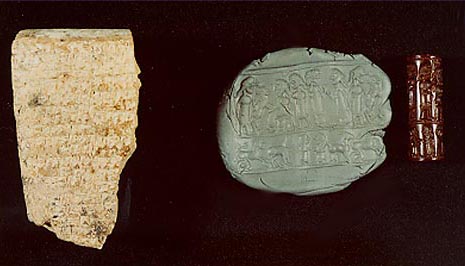


Daily Life
Politics and religion both played important roles in everyday life in Sumer, but religion was more dominant. The people of Sumer, the civilization of Mesopotamia, were polytheistic - they believed in many gods. Also, the gods were both immortal and all-powerful. Thus, the religion of the Sumerians literally became their way of everyday life - they considered themselves to be in the service of the gods in all they did. Because of this, they built great ziggurats, their temples, and gave rich offerings.
The religion shaped the government. Most historians believe that originally, the temple priests controlled the government. It was believed that only the priests could know what the gods wanted, and so they had to lead to keep the people safe. So the ziggurat became the political center of Sumer as well, a place where the priests managed the city.
However, later, kings became common as well. In times of war, the men of the city would choose a commander, or lugal, for the army. As wars became more commonplace, the lugal's responsibility shifted from that of a commander to a king.
Literature

The purpose of Mesopotamian literature was mainly practical. About 99% of the writing that still exists from Mesopotamia is lists of laws, accounting information, inventory, kings, enemies, and other things of that nature. This shows, however, that politics were a large influence on the literature of the time, since much of it consisted of practical records of kings, officials, etc.
However, the most famous (and few) examples of Mesopotamian literature are that of religious nature. This small fraction includes hymns to the gods, as well as a creation story known as Enuma Elish, and the Epic of Gilgamesh. The Epic of Gilgamesh is the most famous of the Mesopotamian works, and tells the tale of Gilgamesh, the king of Uruk, and his quest for immortality. Enuma Elish is actually a Babylonian work, but it came from the Sumerian myth.
To view a summary version of the Epic of Gilgamesh, click here.
To view key excerpts from the summary of the Epic of Gilgamesh click here.
To view Enuma Elish in its entirety, click here.
There are no excerpts from Enuma Elish, because the entire story is based on religion. Therefore, it would be useless. Also, the summary version of the Epic of Gilgamesh was not written by me.